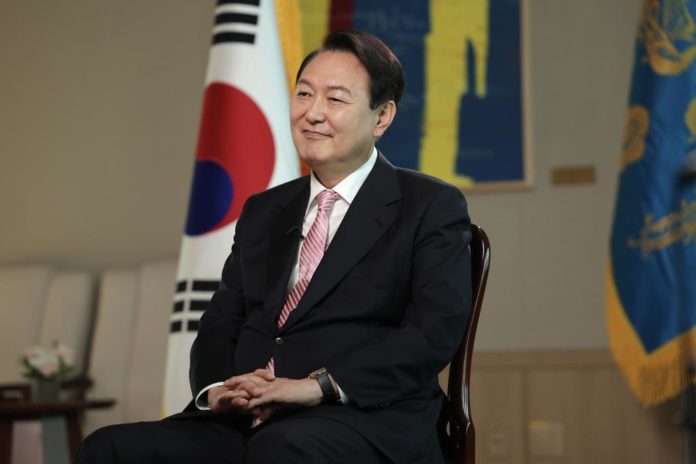This article was originally published by the JoongAng Ilbo and translated by an OKN correspondent.
During the first debate on February 2 ahead of the presidential election, the moderator asked the same question to all candidates – who will they meet first among the leaders from the United States, China, Japan, and North Korea after becoming president? At that time, Yoon Suk-yeol said he will meet the leaders of the United States, Japan, China, and North Korea in order.
When asked why he chose that specific order, Yoon said, “The relationships with the United States and Japan have collapsed under the [South Korean] Democratic Party’s administration that pursued too much servile diplomacy toward China and North Korea.” Since then, Yoon won the presidential election. His comments appeared to be the key pillar of the new administration’s foreign and national security policies.
Yoon vowed to completely fix the Moon Jae-in administration’s policies ever since he became a presidential candidate. In particular, diplomacy and security are the most prominent areas of his “anti-Moon Jae-in” tendency since his inauguration as president. A senior presidential official told the JoongAng Ilbo newspaper on May 24 that “the so-called Korean Peninsula Peace Process and the policy of ‘Three Nos’ pursued by the Moon administration disappeared as soon as the Moon government ended,” adding, “They are not an agreement or treaty that the Yoon government is obliged to abide by.”
It is clear that the Yoon administration is not going to inherit the Moon administration’s key diplomacy and national security policies, the Korean Peninsula Peace Process and the policy of Three Nos. (Editor’s note: The Three Nos is the pact that the Moon administration reportedly agreed to with China in 2017. It means that there will be no additional deployment of the Terminal Altitude Area Defense (THAAD) U.S. antimissile system, no joining a broader U.S. missile defense system, and no Korea-U.S.-Japan military alliance.)
During an interview with CNN, Yoon said, “Just escaping North Korean provocation or conflict temporarily is not something that we should do,” he said, pointing at the previous liberal administration’s conciliatory strategy. “This kind of approach over the past five years has proven to be a failure.” A key presidential official said, “Yoon’s firm opinion is that he will not hold an inter-Korean summit like the previous administration which was like holding a show while trying to read what North Korea has in its mind.”
The foreign policy toward the United States and China was also heading in the opposite direction as the Moon administration. The Moon’s stance was to try to keep balance amid conflict over hegemony between Washington and Beijing. He tried to remain balanced in this situation by putting an emphasis on national security with the United States and China economically. However, Yoon seems to be shifting his focus toward the United States in general. He appears to emphasize national security with the United States and the world economically. In fact, President Yoon attended the launch ceremony of the Indo-Pacific Economic Framework for Prosperity (IPEF), a U.S.-led economic consultative body, on May 23. He also said in a CNN interview on the same day that he is “considering joining” several working groups of the Quad or Quadrilateral Security dialogue, an informal group made up of the U.S., Australia, India, and Japan.
However, President Yoon’s task is to calm China, which will be nervous in inverse proportion to Korea’s close proximity to the United States. President Yoon already made several remarks that could provoke China when he was a candidate, including mentioning the possibility of additional deployment of THAAD, which China strongly opposes. In addition, during a CNN interview, President Yoon said, “I do not believe it is reasonable for China to be overly sensitive about this matter,” when asked about the risk of provoking Beijing which could possibly lead to economic retaliation.
However, China is designated as “the largest trading partner and a major stakeholder in resolving the North Korean nuclear and missile issue,” according to the policy outline presented by Yoon’s transition team. Thus, it will be difficult for the Yoon administration to neglect China’s economic and security values. In response to China’s opposition to Seoul joining IPEF on May 20, President Yoon said, “One does not have to see this in the perspective of a zero-sum game.” He added that the relationship with China can work well in economic areas.
Meanwhile, the Democratic Party (DP) of Korea strongly protested President Yoon’s remarks, which described Moon’s North Korea policy as “servile diplomacy.” The DP issued a written statement under the name of the party’s election commission saying, “It is disappointing and unfortunate that the efforts to resolve North Korea’s nuclear weapons peacefully appeared conciliatory and submissive to President Yoon.” The party added, “Does President Yoon mean that he is willing to face off [with North Korea]?”


